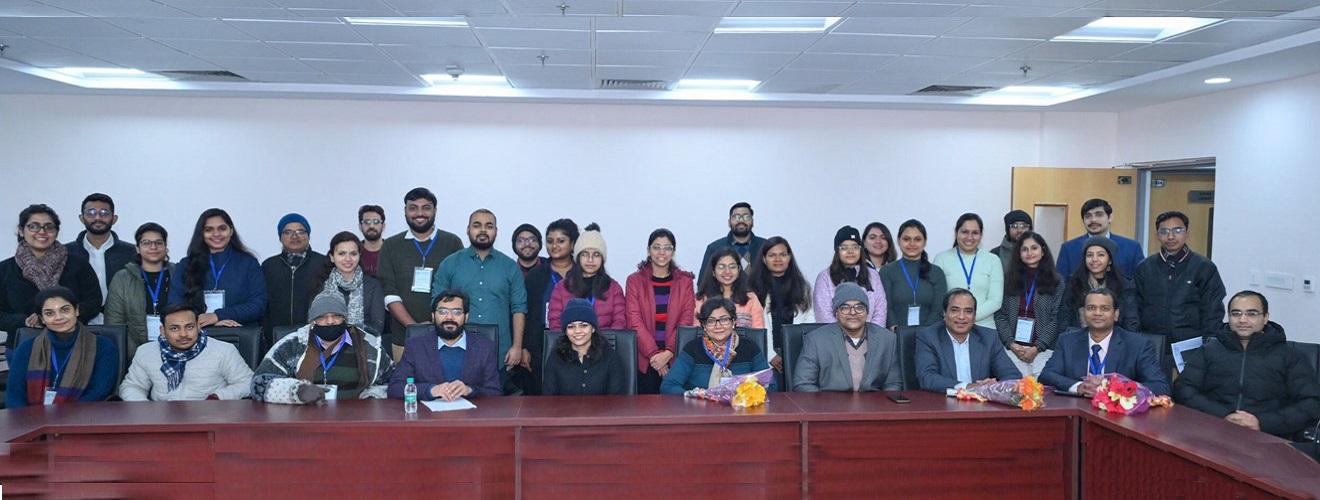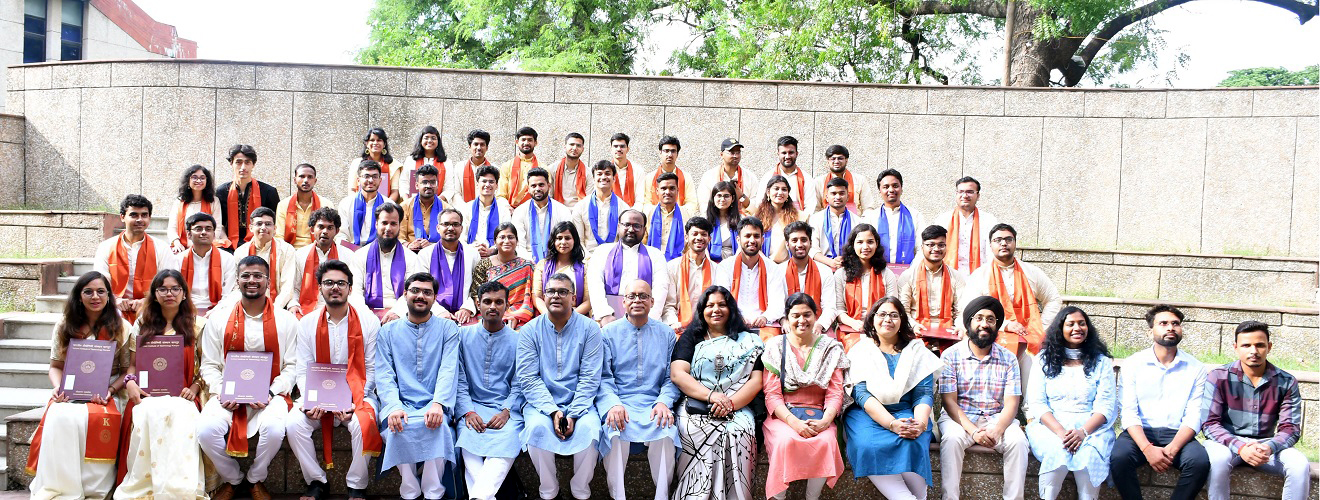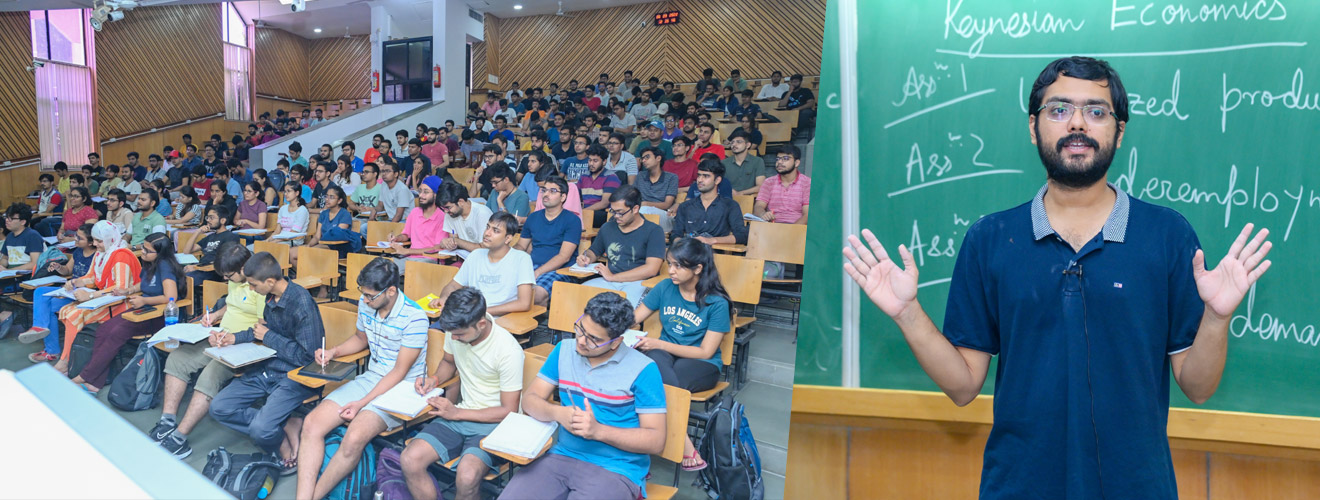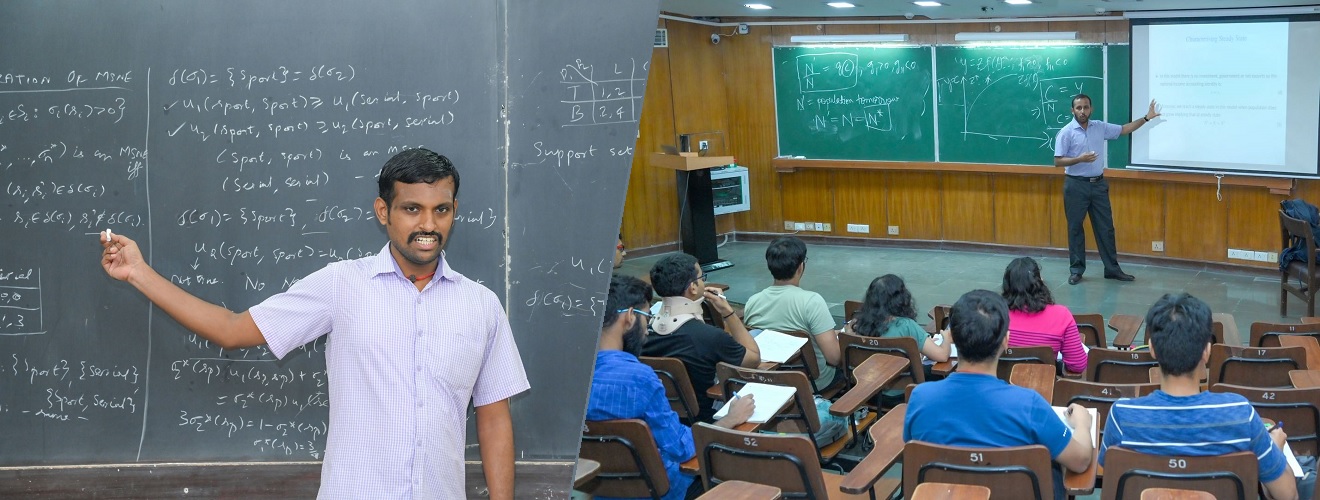About Us
The Department of Economic Sciences has 26 permanent faculty members with research and teaching interests that cover a broad range of fields. Apart from having strength in traditional areas like microeconomics, macroeconomics, and econometrics; the department has expertise in agricultural economics, Bayesian econometrics, behavioral economics, development economics, efficiency, and productivity analysis, environmental economics, financial economics, health economics, industrial economics, international trade, labor economics, law and economics, optimization theory, political economy, family economics, and public policy.
The department primarily offers four degrees in economics: 4 years B.S., 1 year M.S., 2 year M.Sc., and Ph.D. in Economics. Admission for the 52 seats (per year) in the B.S. program is through the advanced joint entrance examination (JEE). B.S. students who satisfy certain eligibility criteria can opt for a 1 year M.S. program in Economics. There is also a provision for the dual degree for undergraduate students of IITK. Admission to the M.Sc. program is through JAM/GATE and a written test conducted by IIT Kanpur. Entry to the Ph.D. program is through a written test and a viva exam conducted once at the beginning of each academic year. The department also offers several e-Masters programs.
- Detailed program of the 2024-25 Public Policy Conference can be found here New
- Result for MSc 2yr 2024 entrance exam held on 7th June 2024 New
- List of Selected candidates for PhD Program 2024-25 New
- The Question paper and Answer key for the 2024-25 exam. New
- Addendum to the List of Shortlisted Candidates for MSc Round 2 Written Test
- List of Shortlisted Candidates for MSc Round 2 Written Test
- List of Shortlisted Candidates for PhD
- Public Policy Conference, August 2024: Call for Papers
- Follow @iitk_econ on Twitter for latest updates
- The 2024 Research Scholars' Day was held on 23rd-24th January
- Arthashashtra-2023
- Recent PhD Placements
Title: Do individuals follow recommendations?
Speaker: Prof. Indrajit Ray from Cardiff University, UK
Date: July 19th, 11:00 am; Venue: ESB-2/435
Title: Economic and Financial Performance of Indian IT Services Export Firms.
Speaker: Prof. P.M.Rao from Long Island University, New York
Date: July 2nd, 12:00 noon; Venue: ESB-2/435
Title: Computable comparative statics of equilibrium in partially ordered models.
Speaker: Tarun Sabarwal from University of Kansas, USA
Date: May 31st, 11:00 am; Venue: ESB-2/435
Title: A theory of international alliances
Speaker: Raghul S. Venkatesh, IISER, Bhopal
Date: April 18th, 3:00 pm; Venue: LH-08
Title: Welfare effects of catastrophic climate events on mountain communities: a case study of the Uttarakhand flash floods
Speaker: Meeta K. Mehra, JNU
Date: April 8th, 12:00 pm; Venue: LH-03
Title: Stable matching with privately observed payments
Speaker: Arunava Sen, ISI, Delhi
Date: April 4th, 3:00 pm; Venue: LH-08
Title: Reserve price competition with demand uncertainty
Speaker: Jeevant Rampal, IIM Ahmedabad
Date: March 21st; Venue: ESB-2/435
Title: Nudging marriage norms through cash transfers
Speaker: Rohini Somanathan, DSE, University of Delhi
Date: March 18th; Venue: ESB-2/435
Public policy Lecture
Title: Insurance sector's role in the Indian economy
Speaker: Abhay Tewari, Managing Director and CEO of Star Union Dai-ichi Life Insurance
Date: March 14th, 12:00 pm; Venue: ESB-2/435
Title: Dynamics of firm growth around policy thresholds: evidence from India
Speaker: Bhanu Gupta, Ashoka University
Date: March 4th, 11:00 am; Venue: ESB-2/435
Public policy Lecture
Title: Public policy in India: concepts and experiences
Speaker: Mr. Kumar Alok, IAS (retired)
Date: March 1st, 12:00 pm; Venue: ESB-2/435
Colloquium Talk Series
Title: Measuring political power at the state level and domination power at individual family level via the Shapley value and the nucleolus
Speaker: T.E.S. Raghavan, University of Illinois Chicago.
Date: February 27th,4:00 pm - 5:00 pm; Venue: LH8
Title: Final offer arbitration
Speaker: T.E.S. Raghavan, University of Illinois, Chicago
Date: February 26th, 11:00 am; Venue: ESB-2/435
Title: Bargaining and cooperation in dynamic games
Speaker: Dilip Abreu, New York University
Date: January 17th, 3:00 pm; Venue: ESB-2/435
Title: General Equilibrium Impact of Japan Joining APTA and APTA without India: A Structural Gravity Analysis
Speaker: Somesh K. Mathur, IIT Kanpur
Date: October 9th, 3:30 pm; Venue: ESB-2/435
Title: Sequential learning in a stochastic multi-armed bandit framework
Speaker: Sandeep Juneja, Tata Institute of Fundamental Research and Google Research
Date: October 5th, 3:30 pm; Venue: Room 435, ESB-2
Public Policy Seminar
Title: TBD
Speaker: Ashutosh Sharma, IIT Kanpur
Date: September 25th, 4pm; Venue: Room 435, ESB-2
Title: Impact of loans on forced labor outcomes
Speaker: Anisha Sharma, Ashoka University
Date: Sept 14th, 3:30 pm; Venue: Room 435, ESB-2
Title: Strengthening prediction models for default risk of unlisted firms
Speaker: Sourish Das, Chennai Mathematical Institute
Date: Sept 4th, 3:30 pm; Venue: Room 435, ESB-2
Title: Trade, Infrastructure and Institutions: Theory and Evidence on Export Quality
Speaker: Saibal Kar, Centre for Studies in Social Sciences, Calcutta
Date: August 24th, 3:30 pm; Venue: Room 435, ESB-2
Title: Optimal intermediary test-and-disclosure-design
Speaker: Ayush Pant, Ashoka University
Date: August 10th, 3:30 pm; Venue: Room 435, ESB-2
Title: The Effect of Syndication on Performance Manipulation in the Venture Capital Industry
Speaker: Shrijata Chattopadhyay, Purdue University
Date: July 4th, 11:30 am; Venue: FB620
Title: The Long-Term Effect of British Colonialism on Women Empowerment in India
Speaker: Punarjit Roychowdhury, Shiv Nadar Uni.
Date: April 17th, 5:30 pm; Venue: Virtual
Title: Cooking up empowerment: Does empowerment influence choice of
household cooking fuel?
Speaker: Zakir Husain, Presidency Uni.
Date: April 13th, 12 noon; Venue: FB620
Title: Conflict with Third-Party Intervention and Revenge: A Game-Theoretic Exploration
Speaker: Soumyanetra Munshi, ISICAL
Date: April 6th, 3pm; Venue: L-12
Title: Feedback Effects and Systematic Risk Exposures
Speaker: Snehal Banerjee, Rady School of Management, University of California, San Diego
Date: February 24th, 9am; Venue: Virtual
Title: Duality Between Multi-Output Production Correspondences and Cost Functions
Speaker: Juan Enrique Martinez-Legaz, Universitat Autònoma de Barcelona
Date: February 6th, 4pm; Venue: TBD
Title: Monetary Incentives and Journal Publications: Evidence from a
Natural Experiment (Joint work with Debashish Bhattacherjee, IIM Calcutta)
Speaker: Prof. Tanika Chakraborty, IIM Calcutta
Date: Monday November 14th, 2022; From 3:30 pm
Venue: L-13 and Virtual
Title: Household preferences for home food consumption under food and cash
constraints, and market imperfections: an inverse-U relationship with income
Speaker: Dr. Lucie Maruejols, University of Gottingen
Date: Monday October 31st, 2022; From 3:30 pm
Venue: L-13 and virtual
Title: Granular Origin of Comovement in Fluctuations
Speaker: Prof. Anindya S. Chakrabarty, Indian Institute of Management Ahmedabad.
Date: Monday October 17th, 2022; From 3:30 pm
Venue: L-13 and Virtual
Title: Demand Side Story: Structural Change and the Decline in Female Labour Force Participation in India
Speaker: Prof. Ashwini Deshpande, Ashoka University.
Date: Thursday October 13th, 2022; From 3:30 pm
Venue: L-13 and Virtual
Title: Does facetime with the boss matter? Soft information communication and organizational performance
Speaker: Dr. Kaushalendra Kishore, CAFRAL
Date: Monday October 10th, 2022; From 3:30 pm
Venue: L-13 and Virtual
Title: A JOURNEY IN SEARCH OF THE UNKNOWN "TRUE" MODEL: Data-Based
Nonparametric Econometrics and Empirical Economics
Speaker: Prof. Aman Ullah, Univ. of California - Riverside
Date: Monday September 26th, 2022; From 7:30 pm
Venue: Virtual
Title: Stable dissolution of a partnership
Speaker: Prof. Debasis Misra, ISI Delhi
Date: Friday September 16th, 2022; From 3:30 pm
Venue: FB-620
Title: Convergence Across Castes
Speaker: Prof. Amartya Lahiri, University of British Columbia.
Date: Wednesday September 14th, 2022; From 5:30 pm
Venue: FB-620
Title: Does the choice of words in the Fed’s Board of Governors’ speeches matter?
Speaker: Prof. Abhinav Anand, IIM Bangalore
Date: Monday September 12th, 2022; From 3:30 pm
Venue: L-13 and Virtual
Title: Culture and Market : A Macroeconomic Tale of Two Institutions
Speaker: Prof. Mausumi Das, Delhi School of Economics
Date: Monday September 5th, 2022; From 3:30 pm
Venue: L-13 and Virtual
Title: Growth Miracles and Consumer Bankruptcy Policy
Speaker: Prof. Urvi Neelakantan
Date: Monday August 29th, 2022; From 6 pm
Venue: Virtual
Title: Automation, Displacement and Democracy
Speaker: Prof. Jaideep Roy, University of Bath
Date: August 08, Monday, 2022; From 3:30 pm
Venue: L-13 and Virtual
Title: Threshold Regression Model with Panel Data - Some Issues
Speaker: Prof. Panchanan Das, University of Calcutta
Date: August 02, Tuesday, 2022; From 3:30 pm
Venue: Room 620, Faculty Building
Title: Rank-preserving Multidimensional Mechanisms
Speaker: Prof. Sushil Bikhchandani, UCLA Anderson School of Management
Date: August 01, Monday, 2022; From 10 am
Virtual Meeting
Title: Characterization results in sequencing with welfare lower bounds: an incentive and an egalitarian approach
Speaker: Dr. Sreoshi Banerjee
Date: July 29, Friday, 2022; From 3:30 pm
Venue: Room 620, Faculty Building
Title: Sectoral Productivity Impacts of Trade Liberalization, Huuman capital formation and industrial policy with macroeconomic dynamics: An expost partial and ex ante general equilibrium analysis
Speaker: Prof. S.K. Mathur, session at the ISID (Institute for Studies in Industrial Development, Delhi) Capacity Building Programme
Date: February 25th, 2022
Title: Impact of Public Procurement on Private Sector: Evidence from Indian Pharmaceutical Industry
Speaker: Prof. Samarth Gupta, National Council of Applied Economic Research (NCAER)
Date: February 8th, 2022; from 6:00 PM to 7:00 PM Venue: Virtual meeting
Title: Why Does Consumption Fluctuate in Old Age and How Should the Government Insure It?
Speaker: Prof. Jeanne Commault , Sciences Po
Date: October 6th, 2021; Venue: Virtual meeting
Title: Till Dowry Do Us Part: Bargaining and Violence in Indian Families
Speaker: Prof. Rossella Calvi, Rice University
Date: September 21st, 2021; Venue: Virtual Meeting
Title: Can Pesion Reforms Solve the “Missing Women” Problem?
Speaker: Prof. Avraham Ebenstein, Hebrew University of Jerusalem
Date: September 6th, 2021; Venue: Virtual Meeting
Title: Why do people stay poor?
Speaker: Prof. Maitreesh Ghatak, London School of Economics
Date: February 19th, 2021; Venue: Virtual Meeting
- Prabheesh, K. P., Wickramarachchi, V., & Kumar, Sanjiv. (2024). Assessing the Impact of US Monetary Policy on Foreign Currency Debt and Credit Growth in Emerging Markets During the COVID-19 Pandemic”. Emerging Markets Finance and Trade, 1-17. https://www.tandfonline.com/doi/abs/10.1080
- Saini, S., Ahmad, W., & Salahuddin. (2024). Do recessions induce the Schumpeterian creative destruction? Micro-evidence from India. Emerging Markets Review, In Press.
- Kaur, M., Ahmad, W., Hari, K. S., & Kattumuri, R. (2024). FinTech entrepreneurial ecosystem in India: Role of incubators and accelerators. Global Finance Journal, In Press.
- Vikram, A. Worst-case efficient and budget-balanced mechanism for single-object allocation with interdependent values. Social Choice and Welfare 62, 89–108 (2024).
- Batham, M., Ojha, M., Mirghasemi, S., and Rahman, M. A. (2023), “Binary and Ordinal Probit Regression: Applications to Public Opinion on Marijuana Legalization in the United States,” Applied Econometric Analysis using Cross Section and Panel Data, edited by Deep Mukherjee, 33-60, 2023. Contribution to Economics, Springer Singapore, Singapore.
- Singh, A., & Vellakkal, S. (2023). Outreach of the programmatic components of National Health Mission in India: An inter- and intra-state analysis using nationally representative data. Journal of Public Affairs (Wiley), e2883 (early view ahead of print). https://doi.org/10.1002/pa.2883
- Archana Srivastava, Somesh K Mathur and Prabir De (2023),” Ex-Ante Evaluation of Indias Trade Alliance with Indo Pacific: A General Equilibrium Analysis”,volume 58, issue 2, Foreign Trade Review, Sage Publication
- T Argaw, J Fledderjohann, E Aurino, S Vellakkal (2023). Children’s Educational Outcomes and Persistence and Severity of Household Food Insecurity in India: Longitudinal Evidence from Young Lives. The Journal of Nutrition (Elsevier).Vol 153 (4), April 2023, Pages 1101-1110.
- Maheshwari, P. and Rahman, M. A.(2023), "bqror: An R Package for Bayesian Quantile Regression in Ordinal Models", The R Journal, 1-17 (forthcoming)
- Archana Srivastava, Somesh K Mathur and Prabir De (2023),"An Ex Ante Evaluation of Indo-Pacific Economic Framework A General Equilibrium Analysis", Economic & Political Weekly JANUARY 28, 2023 vol LVIII no 4
- Vellakkal S,Khan Z, Alavani H, J Fledderjohann, Stuckler D: Effects of public policies in preventing cardiovascular diseases, Public Health (Elsevier). Volume 207, June 2022, Pages 73-81.
- Revisiting the nexus between fiscal decentralization and government size - The role of ethnic fragmentation. Atrayee Choudury and Sohini Sahu, European Journal of Political Economy, Volume 75, December 2022, 102193.
- Cross-country variations in economic complexity: The role of individualism. Garima Maurya and Sohini Sahu, Economic Modelling, Volume 115, October 2022, 105961.
- Fiscal decentralization, regional disparity, and the role of corruption. Nupur Nirola, Sohini Sahu and Atrayee Choudhury, The Annals of Regional Science, Volume 68, 2022
- Archana Srivastava and Somesh K Mathur(2022), "India's Possible Alignment with the RCEP: A General Equilibrium Analysis of Impacts on Carbon Emissions", forthcoming as book chapter in the book entitled" Thirty Years of ASEAN", AIC, RIS, Ministry of External Affairs, Delhi and Cambodia
- Archana Srivastava, Rachna Mathur and Somesh K Mathur (2022),"Evaluation of ASEAN–India Free Trade Regime: A General Equilibrium Approach", Journal of Asian Economic Integration, Volume 4, Number 2, Sage Publication, Thailand, New Delhi
- Chopra, A., M., Lahiri. A, (2022), "Pandemics through the lens of occupations", Canadian Journal of Economics
- Vikram A.,"A top-only mechanism with reserve price for single-good allocation problem." Economics Letters (2022): 110646.
- Dar, S. S., & Sahu, S. (2022). The effect of language on financial inclusion. Economic Modelling, 105693.
- Dutta, J., & Martínez-Legaz, J. E. (2021). Error bounds for inequality systems defining convex sets. Mathematical Programming, 189(1), 299-314.
- A Kanya, T Marthias, S Vellakkal, N Carvalho, R Atun, A Morgan, Y Zhao, E Hulse, B McPake, J Lee (2021). Socioeconomic inequalities ineffective service coverage for reproductive, maternal, newborn, and child health: a comparative analysis of 39 low-income and middle-income countries, EClinicalMedicine-LANCET, Volume 40
- Singh, A., & Vellakkal, S.(2021). "Impact of public health programs on maternal and child health services and health outcomes in India: A systematic review". Social Science & Medicine, 113795.
- Saini, S., Ahmad, W.,& Bekiros, S. (2021). "Understanding the credit cycle and business cycle dynamics in India". International Review of Economics & Finance, 76, 988-1006.
- Khan, M. A., & Ahmad, W.(2021). "Fresh Evidence on the Relationship between Market Power and Default Risk of Indian Banks". Finance Research Letters (Forthcoming).
- Dempe, S., Dinh, N., Dutta, J., & Pandit, T. (2021). "Simple bilevel programming and extensions". Mathematical Programming,188(1), 227-253.
Programs Offered
BS/MS Program
BS/MS program in Economics
M.Sc. Program
M.Sc. program in Economics
Ph.D. Program
Ph.D. in Economics
e-Masters
e-Masters programs for freshers and professionals.





